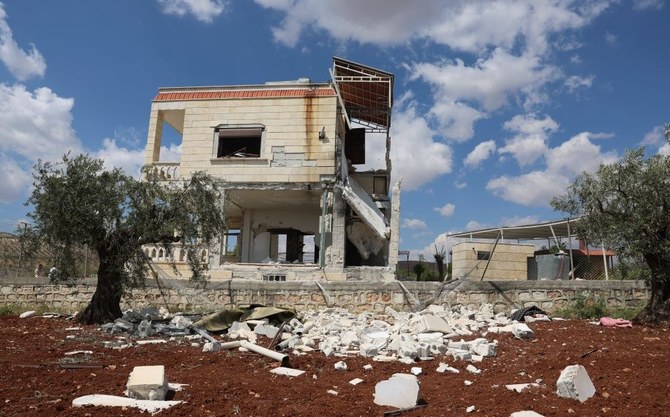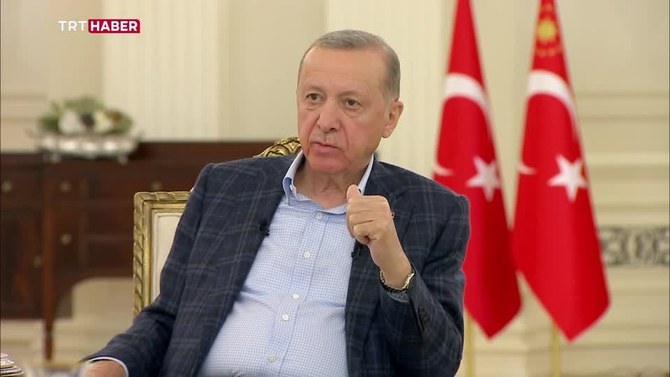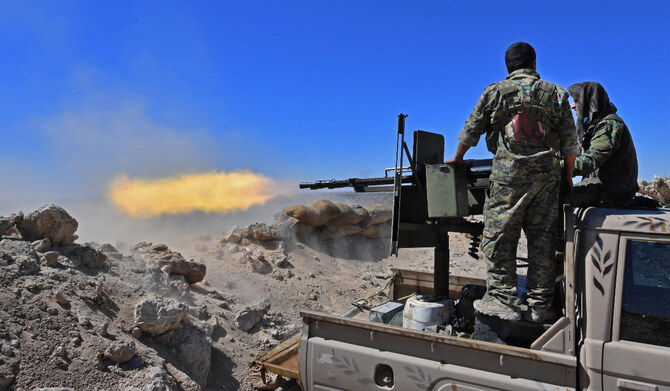ANKARA: Recep Tayyip Erdogan’s announcement of the death of Daesh’s leader last week highlights Turkiye’s leading role in regional security and boosts his claims to be tough on terrorists in the days before crunch elections, analysts have said.
The Turkish president said on April 30 that agents from the MIT security agency had killed Abu Hussein Al-Qurayshi in Syria the previous day, but gave no further details. Reuters reported local and security sources as saying that he died in a raid in the northern town of Jandaris, which is controlled by Turkiye-backed rebel groups.
Erdogan said he was committed to “continue our fight against terrorist organizations without discrimination.”
The previous leader of Daesh, Abu Ibrahim Al-Qurayshi, died in February last year in a US raid on his hideout in northern Syria. His predecessor Abu Bakr Al-Baghdadi was killed near Idlib in October 2019 in another US raid.
Abu Hussein Al-Qurayshi was appointed as Daesh leader in November 2022.
“The operational tempo of US strikes against Daesh leadership means that we barely even know who these individuals are, we only know their nom de guerre,” Colin P. Clarke, director of research at the Soufan Group, told Arab News.
“The last few ISIS (Daesh) caliphs have almost no media footprint because they were so busy trying to stay alive.”
The Turks, similarly, are “now able to track these Daesh leaders closely, and take action, so Daesh in Syria is reeling from repeated targeted assassinations against its upper echelon of leadership,” he said.
Clarke said that he expected these operations were being timed for Erdogan’s maximum election benefit.
“He has always presented himself as a strong figure, and he’s working to make that contrast in this election with (opposition leader Kemal) Kilicdaroglu,” he said.
“The strongman image is something Erdogan has cultivated over his time in office, so touting high-level counterterrorism operations will help him continue to make that case.”
MIT previously caught Daesh fundraiser Kasim Guler, also named Abu Usama al-Turki, while trying to sneak into Turkiye in June 2021 with weapons and explosives.
He had been allegedly planning to assassinate politicians, including Kilicdaroglu.
MIT also detained several high-profile Daesh figures who had directed several suicide attacks in Turkiye.
Turkiye designated Daesh as a terror group in 2013. It has launched a string of outrages since then, including an October 2015 suicide attack on a peace march in Ankara that killed 109 people.
Turkish security forces have prosecuted an intense crackdown on the group in the months leading up to the country’s May 14 elections. Nine foreign nationals were arrested in an anti-Daesh operation in Ankara last week, taking to 35 the total number arrested inside Turkey since the start of the year.
Nihat Ali Ozcan, a security analyst at the Ankara-based think tank TEPAV, said the operation against the Daesh leader last month in Syria was also a message for the West,
“It gives the message that Turkiye has assumed an active role in the fight against all radical terror groups,” he told Arab News.
“Turkiye is still part of this regional counter-terror effort and intends to underline the fact that it does not only target the outlawed Kurdistan Workers’ Party (PKK) but also Daesh,” Ozcan said.
In the meantime, Turkish forces continue their operation against the PKK in northern Iraq with airstrikes against hideouts.























